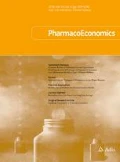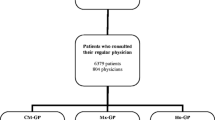Abstract
Summary
Prescribing costs in general practice continue to grow. Their importance is underlined by the amount of information concerned with costs that general practitioners (GPs) receive, and by the existence of target budgets. In 1986 and 1991, surveys showed that GPs agreed that cost should be borne in mind when choosing medicines, but that their knowledge of drug prices was often inaccurate. This study assessed the current knowledge and attitudes of GPs in the UK in respect of prescribing costs, and examined the influence of various developments in general practice since 1986 on the accuracy of drug price estimation.
1000 randomly selected GP principals (500 in Scotland and 125 in each of 4 English health regions) were sent a postal questionnaire. The GPs’level of agreement with 5 statements concerned with prescribing costs, and the accuracy of their estimates of the basic price of 31 drugs, were analysed.
Most GPs (71 %) agreed that prescribing costs should be taken into account when deciding on the best treatment for patients. Fundholders were more likely than non-fundholders: (i) to agree that prescribing costs could be reduced without affecting patient care; (ii) to agree that providing more information on costs would lower the cost of prescribing; and (iii) to comment that cost guidelines had changed their prescribing habits. Fundholders were less likely than nonfundholders to reject the principle of fixed limits on prescribing costs.
Overall, one-third of the price estimates given were accurate (within 25% of the actual cost). For the most expensive drugs in the survey [those priced over 10 pounds sterling ( £ ) per pack], half of the price estimates were accurate. There were significant differences between non-fundholders’ and fundholders’ estimates of the price ofless expensive drugs (those priced at less than £ 10 per pack). Use of a formulary or computer-displayed drug price information did not affect the accuracy of price estimates.
It may be that GPs who were more knowledgeable and concerned about costs were more likely to become fundholders. It is also possible that the expansion of fundholding, or other mechanisms that give GPs responsibility for resource allocation, might improve accurate cost awareness in prescribing. Clinical and economic review of repeat prescribing is recommended.
Similar content being viewed by others
References
Audit Commission. A prescription for improvement. London: HMSO, 1994
House of Commons Health Committee. Priority selling in the NHS: the NHS drugs budget. London: HMSO, 1994
Denig P, Haaijer-Ruskamp FM. Do physicians take cost into account when making prescribing decisions? PharmacoEconomics 1995; 8: 282–90
Begg D, Fisher S, Dornbusch R. Economics. London: McGraw-Hill, 1984
Scollish Office Home and Health Department. Improving prescribing in Scolland. Edinburgh: SOHHD, 1991
Ryan M, Yule B. The way to economic prescribing. Health Policy 1993; 15: 25–38
Walley T, Wilson R, Bligh J. Current prescribing in primary care in the UK: effects of the indicative prescribing scheme and GPfundholding. PharmacoEconomics 1995; 7: 320–31
Scouish Office Home and Health Department. Introducing Scouish prescribing analysis. Edinburgh: SOHHD, 1990
Ryan M, Yule B, Bond C, et al. Scouish general prescribers’ attitudes and knowledge in respect of prescribing costs. BMJ 1990; 300: 1316–8
Ryan M, Yule B, Bond C, et al. Knowledge of drug costs: a comparison of general practitioners in Scotland and England. Br J Gen Pract 1992; 42: 6–9
National Audit Office. General practitioner fundholding in England. London: HMSO, 1994
Duncan C. editor. Monthly index of medical specialities (February 1995). London: Haymarket, 1995
NHS England and Wales. Drug tariff (February 1995). London: HMSO, 1995
NHS in Scotland. Scottish drug tariff (March 1995). Edinburgh: SOHHD, 1995
The cost of drugs. Why are they increasing? In: IHE Information. No.2 June 1995. Lund: The Swedish Institute for Health Economics, 1995
Chaplin S. Industry blues over conservative prescribing. Prescriber 1993 August; 5: 44–5
Gllratlini S, Garatlini L. Pharmaceutical prescriplions in four European countries. Lancet 1993; 342: 1191–2
Ryan M, Yule B, Bond C, et al. Do physicians’ perceptions of drug costs influence their prescribing. PharmacoEconomics 1996; 9: 321–31
Leese B, Bosanquet N. Change in general practice and its effects on service provision in areas with different socioeconomic characteristics. BMJ 1995; 311: 546–50
Audit Commission briefing on GP fund holding. London: HMSO, 1995
Information and Statistics Division. Scottish health statistics 1994. Edinburgh: ISO Publications, 1994
Depanment of Health. Health and personal social services statistics for England. London: HMSO, 1994
Walley T, Wilson R, Bligh J. Current prescribing in primary care in the UK. PharmacoEconomics 1995; 7: 320–31
Long MJ, Cummings MK, Frisof KB. The role of perceived price in physicians’ demand for diagnostic tests. Med Care 1983; 21: 243–50
Author information
Authors and Affiliations
Rights and permissions
About this article
Cite this article
Silcock, J., Ryan, M., Bond, C.M. et al. The Cost of Medicines in the United Kingdom. Pharmacoeconomics 11, 56–63 (1997). https://doi.org/10.2165/00019053-199711010-00007
Published:
Issue Date:
DOI: https://doi.org/10.2165/00019053-199711010-00007




